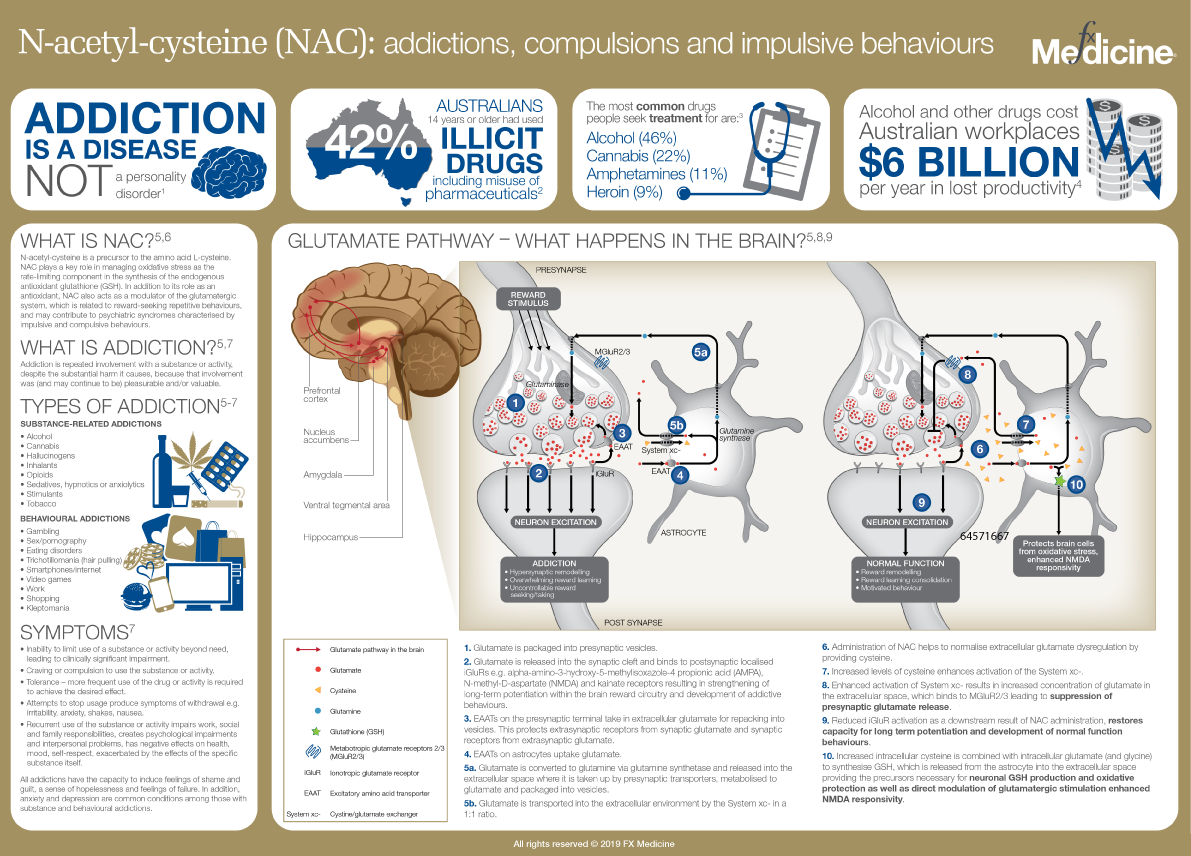
Addiction is a condition that results in a loss of control over a behaviour, activity or ingestion of a substance. Despite adverse consequences, the pleasure response associated with addiction compels an individual to continue their involvement. Addiction changes both brain structure and function.
Development of addictive behaviour include factors such as primary (unconditioned) reward, secondary (conditioned) reward, sensitisation processes, reinforcement reward learning, withdrawal, reinstatement and relapse after periods of abstinence.
Traditionally, addiction research has focused on mechanisms involving dopamine and endogenous opioids. More recently, it has become increasingly evident that glutamate is also involved in addiction, and glutamatergic mechanisms play a central role in the processes underlying the development and maintenance of addiction. These processes include reinforcement, sensitisation, habit learning and reinforcement learning, context conditioning, craving and relapse. It appears that while many actions of glutamate derive their importance from a stimulatory interaction with the dopaminergic system, there are some glutamatergic mechanisms that contribute to addiction independent of dopaminergic systems. A better understanding of the underlying mechanisms might open new avenues to the treatment of addiction, in particular regarding relapse prevention.
In recognition of these factors, the use of NAC as a glutamatergic agent for the treatment of addiction is beginning to emerge in the field of psychiatric research. In this infographic we take a closer look at NAC and the research supporting its efficacy in the treatment of addictions.
REFERENCES
- Addiction. Psychology Today 2015. Viewed 19 May 2015. https://www.psychologytoday.com/basics/addiction/symptoms
- Illicit use of drugs (NDSHS 2013 key findings). Authoritative information and statistics to promote better health and wellbeing 2013. Viewed 19 May 2015, http://www.aihw.gov.au/alcohol-and-other-drugs/ndshs/2013/illicit-drug-use/
- Alcohol and other drug treatment services in Australia 2011-12. Australian Institute of Health and Welfare, 2013. Canberra: AIHW. [PDF]
- Manning M, Smith C, Mazerolle P. The societal costs of alcohol misuse in Australia. Canberra: Australian Institute of Criminology, 2013. [Full text]
- Everitt BJ. Neural and psychological mechanisms underlying compulsive drug seeking habits and drug memories – indications for novel treatments of addiction. Eur J Neurosci 2014;40:2163-2182. [Full text]
- Sansone RA, Sansone LA. Getting a knack for NAC: N-acetyl-cysteine. Innov Clin Neurosci 2011;8(1):10-14. [Full text]
- Horvath T, Misra K, Epner AK, et al. Addictions. CenterSite 2015. Viewed 19 May 2015, http://www.centersite.net/poc/view_doc.php?type=doc&id=48329&cn=1408
- Murray JE, Lacoste J, Belin D, N-Acetylcysteine as a treatment for addiction. In: D Belin (Ed.) Addictions – from pathophysiology to treatment. Intech (pp. 355-380), 2012. [eBook]
- Philibin SD, Hernandez A, Self D, et al. Striatal signal transduction and drug addiction. Front Neuroanat 2011;5(60):1-15. [Full text]
This image by FX Medicine is licensed under a Creative Commons Attribution-NonCommercial-NoDerivatives 4.0 International License.
More information about how to share/use the infographics for personal use.
If you interested in using any FX Medicine content for commercial use please contact us.
DISCLAIMER:
The information provided on FX Medicine is for educational and informational purposes only. The information provided on this site is not, nor is it intended to be, a substitute for professional advice or care. Please seek the advice of a qualified health care professional in the event something you have read here raises questions or concerns regarding your health.




